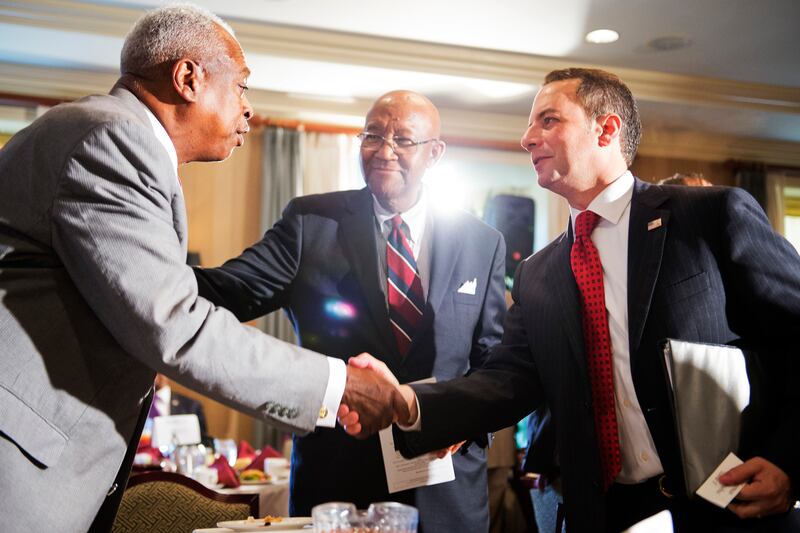They were very patient at the RNC’s commemoration of the 50th anniversary of the March on Washington on Monday. The Republicans all waited to eat their cheesecake while diligently devouring their greens.

In a long, narrow dining room festooned with portraits of Republican presidents (they had a complete chronological set from Herbert Hoover to Ronald Reagan on the walls, with two Lincolns and a Teddy Roosevelt to boot), over 100 people, a predominantly African-American crowd of Republicans and civil-rights activists, gathered for a rubber-chicken luncheon to pay tribute to Martin Luther King Jr. and attempt to signal the Republican Party’s renewed interest in courting black voters—of whom only 6 percent cast ballots for Mitt Romney in 2012. But things started going wrong from the beginning: the tables were laid with hefty slices of cheesecake, along with the salad appetizer, long before the main course arrived, and the microphone wasn’t working.
For about 20 minutes there were weird echoes across the room, as seemingly only every other word was amplified. It had a particularly strange effect on the singing of the national anthem. Once the sound system started working again, the gathering hit yet another pitfall. Attendees could, unfortunately, hear every word in a series of speeches that often veered off message. T.W. Shannon, the 34-year-old speaker of the Oklahoma House of Representatives, told a strange story about a woman fending off a moose attack on her elderly husband in Alaska, and Alveda King, the Republican niece of Martin Luther King Jr., touted the Willard, a five-star luxury hotel where both Lincoln and King stayed and where the cheapest room on Monday went for over $600. These gaffes paled in comparison to those of Robert Woodson Sr., the president of the Center for Neighborhood Enterprise, who decried the commemoration held over the weekend by the National Action Network, a group headed by the Rev. Al Sharpton, and attended by many prominent Democrats. Woodson claimed that the plight of blacks, particularly poor blacks, was ignored as “everybody has come in front of them on the bus. Gays, immigrants, women, environmentalists.” Woodson went on to decry those “corrupt” black politicians who were responsible for this as “moral traitors.” But the luncheon wasn’t all busted microphones and gaffe-prone speakers.
Congressman James Sensenbrunner (R-WI), former chairman of the House Judiciary Committee and sponsor of the 2007 renewal of the Voting Rights Act, proclaimed “my job is to fix the Voting Rights Act” and vowed that, by the end of 2013, Congress would pass a revised and constitutional version of the law, which was struck down in part by the Supreme Court in June. Others hit consistent themes that they felt confident would appeal to many black voters, pushing education reform and decrying cuts to Historically black colleges and universities (HBCUs) under the Obama dministration. But no one believed that the Grand Old Party would have an easy time wooing African-Americans, and the rhetorical nods to the long-vanished days when Republicans were the party of Frederick Douglass were kept to a minimum.
For all the rote talk of Abraham Lincoln and Martin Luther King Jr., the real inspiration behind the event was a far more idiosyncratic civil-rights hero, Jack Kemp, the former New York congressman and secretary of Housing and Urban Development under President George H.W. Bush. Kemp, who once described himself as a “bleeding-heart conservative,” actively tried to woo African-American voters, working hard to find what he considered free-market solutions to the economic woes facing the inner city. Hilary Shelton, who is director of the NAACP’s Washington bureau and attended the event as a guest, spoke glowingly of Kemp to The Daily Beast, describing him as “a hero to the NAACP.” Although Kemp died in 2009, his son Jimmy spoke at the event and retold a story of how his father discovered racism when his African-American teammate on the Buffalo Bills, Cookie Gilchrist, encountered discrimination on a trip to Texas.
Although the Republican Party had a difficult time attracting African-American voters in Kemp’s heyday in the 1980s and early 1990s, it still received support from over 10 percent of African-Americans in presidential elections—twice what Mitt Romney received in 2012. The goal of the event seemed to simply be to get the party back to those levels of support.
There were no fevered dreams that the segregationist roots of the Democratic Party would somehow convince African-Americans to convert en masse to the GOP, the party of Lincoln. Instead the attendees were willing to settle for becoming the party of Jack Kemp once again.






